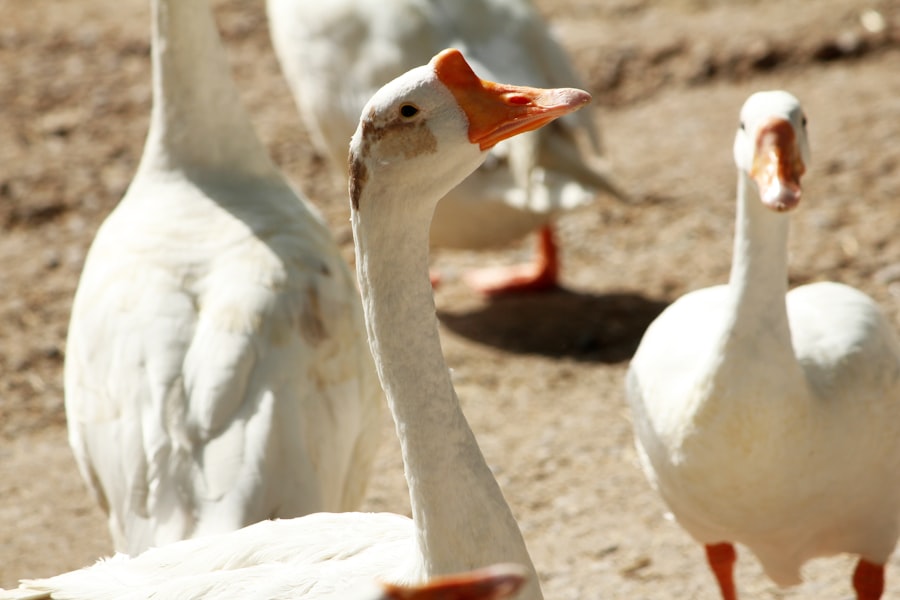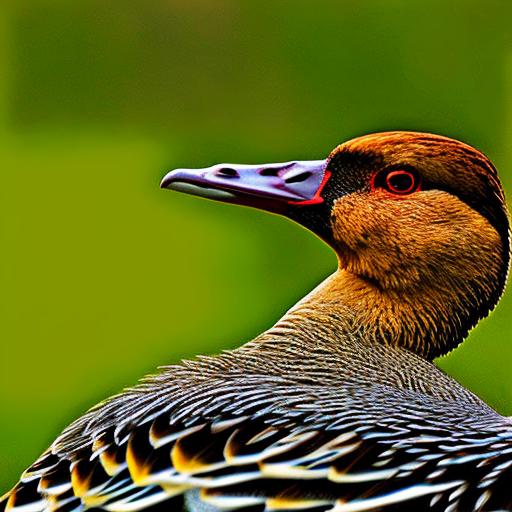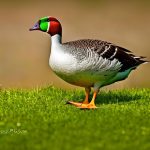Geese invading lawns can be a frustrating problem for many homeowners. These large birds can cause damage to lawns, leave behind droppings that are unsightly and unsanitary, and even become aggressive towards humans and pets. In order to effectively deter geese from invading your lawn, it is important to understand their behavior and implement the right methods. In this post, we will discuss various methods that can be used to keep geese away, including creating physical barriers, utilizing natural repellents, installing decoys, implementing sound deterrents, removing food sources, using visual deterrents, employing trained dogs, seeking professional help, and consistently maintaining your lawn.
Key Takeaways
- Geese are attracted to open spaces with access to water and food sources.
- Physical barriers such as fences or netting can prevent geese from accessing your lawn.
- Natural repellents like grape concentrate or predator urine can deter geese from settling in.
- Decoys like fake predators or swans can trick geese into thinking your lawn is already occupied.
- Sound deterrents like loud noises or predator calls can scare geese away.
Understanding the behavior of geese
Geese are attracted to lawns for several reasons. First, lawns provide a source of food for geese. They feed on grass and insects that are commonly found in lawns. Second, lawns provide an open space for geese to rest and nest. Geese prefer open areas where they can easily spot predators and have a clear line of sight. Finally, lawns provide a source of water for geese. They are attracted to areas with water nearby, such as ponds or lakes.
Geese are also territorial birds and will defend their nesting sites aggressively. They will often return to the same nesting site year after year. This territorial behavior can make it difficult to deter geese from your lawn once they have established it as their nesting site. It is important to understand these behaviors in order to effectively deter geese from invading your lawn.
Creating a physical barrier to keep geese away
One effective method of deterring geese from your lawn is by creating a physical barrier. There are several types of barriers that can be used, including fences and netting. Fences should be at least three feet high and have small openings to prevent geese from squeezing through. Netting can be used to cover areas where geese are likely to land or nest, such as ponds or lawns.
When installing a physical barrier, it is important to make sure it is properly installed and maintained. Fences should be securely anchored to the ground to prevent geese from pushing under them. Netting should be tightly secured and regularly checked for any tears or holes. It is also important to regularly trim any overhanging branches or vegetation that could provide access for geese.
Utilizing natural repellents to deter geese
Another method of deterring geese from your lawn is by utilizing natural repellents. Natural repellents, such as vinegar and garlic, can be effective in deterring geese due to their strong odors. These odors can make your lawn unappealing to geese and discourage them from landing or nesting.
To apply natural repellents, mix vinegar or garlic with water and spray the mixture onto your lawn. It is important to reapply the repellent regularly, especially after rain or watering, as the odor can dissipate over time. It is also important to avoid spraying the repellent directly onto plants or flowers, as it can damage them.
Installing decoys to trick geese into avoiding your lawn
Decoys can be an effective method of tricking geese into avoiding your lawn. There are several types of decoys that can be used, including fake predators and reflective tape. Fake predators, such as plastic owls or coyotes, can be placed in areas where geese are likely to land or nest. The presence of these predators can scare geese away.
Reflective tape can also be effective in deterring geese. The tape reflects light and creates a visual deterrent for geese. It can be hung from trees or posts around your lawn to create a barrier that geese are less likely to cross.
When installing decoys, it is important to properly place and maintain them. Decoys should be moved regularly to prevent geese from becoming accustomed to their presence. Reflective tape should be checked regularly for any damage or wear and replaced as needed.
Implementing sound deterrents to scare geese off

Sound deterrents can be an effective method of scaring geese off your lawn. There are several types of sound deterrents that can be used, including noise makers and ultrasonic devices. Noise makers, such as propane cannons or motion-activated sprinklers, can create loud noises that scare geese away. Ultrasonic devices emit high-frequency sounds that are unpleasant to geese and can deter them from landing or nesting.
When using sound deterrents, it is important to properly use and maintain them. Noise makers should be set up in areas where geese are likely to land or nest and activated at regular intervals. Ultrasonic devices should be placed strategically around your lawn to create a barrier that geese are less likely to cross. It is also important to regularly check and maintain the devices to ensure they are working properly.
Removing food sources to discourage geese from staying
One effective method of discouraging geese from staying on your lawn is by removing their food sources. Geese feed on grass and insects that are commonly found in lawns. By removing these food sources, you can make your lawn less appealing to geese.
To remove grass as a food source, regularly mow your lawn and keep it at a short height. This will make it less attractive for geese to feed on. To remove insects as a food source, regularly treat your lawn with insecticides or use natural methods, such as nematodes or beneficial insects, to control insect populations.
It is also important to prevent food sources from returning to your lawn. This can be done by regularly removing any fallen leaves or debris that can attract insects. It is also important to properly dispose of any food waste or bird feeders that can attract geese.
Using visual deterrents to make your lawn unappealing to geese
Visual deterrents can be an effective method of making your lawn unappealing to geese. There are several types of visual deterrents that can be used, including scarecrows and flags. Scarecrows can be placed in areas where geese are likely to land or nest and create a visual deterrent. Flags can be hung from trees or posts around your lawn to create a barrier that geese are less likely to cross.
When using visual deterrents, it is important to properly use and maintain them. Scarecrows should be moved regularly to prevent geese from becoming accustomed to their presence. Flags should be checked regularly for any damage or wear and replaced as needed.
Employing trained dogs to chase geese away
Trained dogs can be an effective method of deterring geese from your lawn. Dogs are natural predators to geese and their presence can scare them away. There are several breeds of dogs that are commonly used for goose control, such as Border Collies and Labrador Retrievers.
When employing trained dogs, it is important to properly train and use them. Dogs should be trained to respond to commands and be comfortable around water, as geese are often found near water sources. It is also important to regularly exercise and socialize the dogs to ensure they are well-behaved and effective in deterring geese.
Seeking professional help to manage geese populations
If you are unable to effectively deter geese from your lawn on your own, it may be necessary to seek professional help. Professionals who specialize in wildlife management can provide expert advice and assistance in managing geese populations. They can assess your situation, recommend the most appropriate methods, and implement them effectively.
When seeking professional help, it is important to find a reputable professional. Look for professionals who are licensed and insured, have experience in wildlife management, and have positive reviews or testimonials from previous clients. It is also important to discuss your specific needs and expectations with the professional to ensure they can meet them.
Consistently maintaining your lawn to prevent geese from settling in
Consistently maintaining your lawn is an important step in preventing geese from settling in. Geese are attracted to lawns that are well-kept and provide a source of food, water, and shelter. By regularly mowing, watering, and fertilizing your lawn, you can make it less appealing to geese.
It is also important to regularly remove any fallen leaves or debris that can attract geese. This will prevent them from finding food sources or nesting materials on your lawn. Additionally, regularly inspect your lawn for any signs of geese, such as droppings or feathers, and take appropriate action to deter them.
In conclusion, there are several methods that can be used to effectively deter geese from invading your lawn. These methods include creating physical barriers, utilizing natural repellents, installing decoys, implementing sound deterrents, removing food sources, using visual deterrents, employing trained dogs, seeking professional help, and consistently maintaining your lawn. It is important to try different methods and find what works best for your situation. By understanding the behavior of geese and implementing the right methods, you can successfully keep geese away from your lawn.
If you’re looking for effective ways to keep geese off your lawn, you might also be interested in learning about the benefits of renting a chicken coop. Poultry Wizard offers a helpful article on their website that explains how renting a chicken coop can not only provide you with fresh eggs but also help deter geese from invading your property. By having chickens in your yard, the presence of these natural predators can discourage geese from settling in and causing damage. To find out more about renting a chicken coop and its advantages, check out Poultry Wizard’s article here.
FAQs
What are some natural ways to keep geese off your lawn?
Some natural ways to keep geese off your lawn include planting tall grasses or shrubs, using decoys or scare tactics, and installing barriers such as fencing or netting.
What are some non-natural ways to keep geese off your lawn?
Some non-natural ways to keep geese off your lawn include using chemical repellents, sonic devices, or motion-activated sprinklers.
Why do geese like to graze on lawns?
Geese like to graze on lawns because they provide a source of food, particularly for young geese who are still learning to forage.
Are geese harmful to lawns?
Geese can be harmful to lawns as their droppings can damage grass and create unsightly brown patches. Additionally, their constant grazing can lead to soil compaction and erosion.
Can geese be beneficial to lawns?
Geese can be beneficial to lawns as their droppings can act as a natural fertilizer, providing nutrients to the soil. Additionally, their grazing can help to control weeds and other unwanted vegetation.
What should I do if geese are causing damage to my lawn?
If geese are causing damage to your lawn, you can try using natural or non-natural methods to deter them. If these methods are not effective, you may need to contact a professional wildlife control service for assistance.
Meet Walter, the feathered-friend fanatic of Florida! Nestled in the sunshine state, Walter struts through life with his feathered companions, clucking his way to happiness. With a coop that’s fancier than a five-star hotel, he’s the Don Juan of the chicken world. When he’s not teaching his hens to do the cha-cha, you’ll find him in a heated debate with his prized rooster, Sir Clucks-a-Lot. Walter’s poultry passion is no yolk; he’s the sunny-side-up guy you never knew you needed in your flock of friends!







